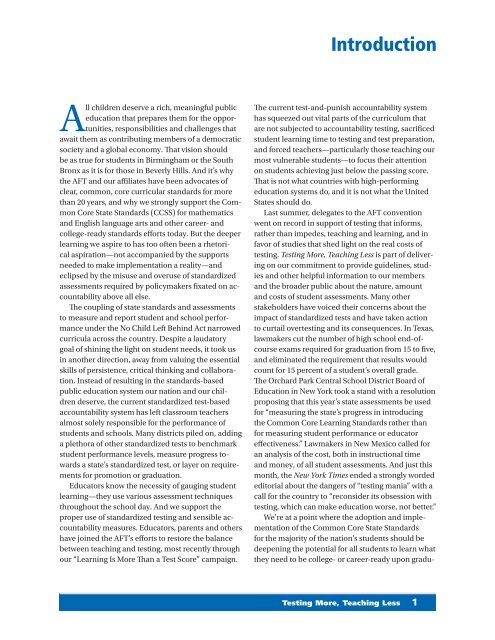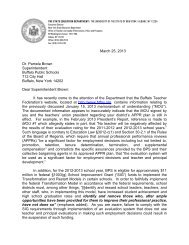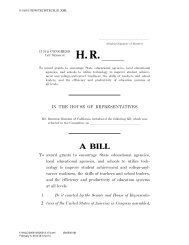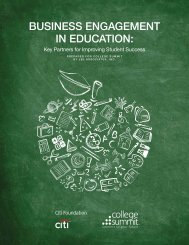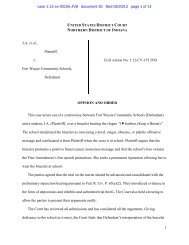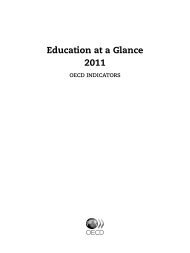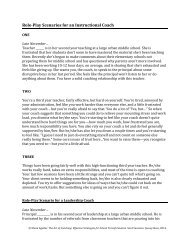Testing More, Teaching Less - American Federation of Teachers
Testing More, Teaching Less - American Federation of Teachers
Testing More, Teaching Less - American Federation of Teachers
- No tags were found...
You also want an ePaper? Increase the reach of your titles
YUMPU automatically turns print PDFs into web optimized ePapers that Google loves.
IntroductionAll children deserve a rich, meaningful publiceducation that prepares them for the opportunities,responsibilities and challenges thatawait them as contributing members <strong>of</strong> a democraticsociety and a global economy. That vision shouldbe as true for students in Birmingham or the SouthBronx as it is for those in Beverly Hills. And it’s whythe AFT and our affiliates have been advocates <strong>of</strong>clear, common, core curricular standards for morethan 20 years, and why we strongly support the CommonCore State Standards (CCSS) for mathematicsand English language arts and other career- andcollege-ready standards efforts today. But the deeperlearning we aspire to has too <strong>of</strong>ten been a rhetoricalaspiration—not accompanied by the supportsneeded to make implementation a reality—andeclipsed by the misuse and overuse <strong>of</strong> standardizedassessments required by policymakers fixated on accountabilityabove all else.The coupling <strong>of</strong> state standards and assessmentsto measure and report student and school performanceunder the No Child Left Behind Act narrowedcurricula across the country. Despite a laudatorygoal <strong>of</strong> shining the light on student needs, it took usin another direction, away from valuing the essentialskills <strong>of</strong> persistence, critical thinking and collaboration.Instead <strong>of</strong> resulting in the standards-basedpublic education system our nation and our childrendeserve, the current standardized test-basedaccountability system has left classroom teachersalmost solely responsible for the performance <strong>of</strong>students and schools. Many districts piled on, addinga plethora <strong>of</strong> other standardized tests to benchmarkstudent performance levels, measure progress towardsa state’s standardized test, or layer on requirementsfor promotion or graduation.Educators know the necessity <strong>of</strong> gauging studentlearning—they use various assessment techniquesthroughout the school day. And we support theproper use <strong>of</strong> standardized testing and sensible accountabilitymeasures. Educators, parents and othershave joined the AFT’s efforts to restore the balancebetween teaching and testing, most recently throughour “Learning Is <strong>More</strong> Than a Test Score” campaign.The current test-and-punish accountability systemhas squeezed out vital parts <strong>of</strong> the curriculum thatare not subjected to accountability testing, sacrificedstudent learning time to testing and test preparation,and forced teachers—particularly those teaching ourmost vulnerable students—to focus their attentionon students achieving just below the passing score.That is not what countries with high-performingeducation systems do, and it is not what the UnitedStates should do.Last summer, delegates to the AFT conventionwent on record in support <strong>of</strong> testing that informs,rather than impedes, teaching and learning, and infavor <strong>of</strong> studies that shed light on the real costs <strong>of</strong>testing. <strong>Testing</strong> <strong>More</strong>, <strong>Teaching</strong> <strong>Less</strong> is part <strong>of</strong> deliveringon our commitment to provide guidelines, studiesand other helpful information to our membersand the broader public about the nature, amountand costs <strong>of</strong> student assessments. Many otherstakeholders have voiced their concerns about theimpact <strong>of</strong> standardized tests and have taken actionto curtail overtesting and its consequences. In Texas,lawmakers cut the number <strong>of</strong> high school end-<strong>of</strong>courseexams required for graduation from 15 to five,and eliminated the requirement that results wouldcount for 15 percent <strong>of</strong> a student’s overall grade.The Orchard Park Central School District Board <strong>of</strong>Education in New York took a stand with a resolutionproposing that this year’s state assessments be usedfor “measuring the state’s progress in introducingthe Common Core Learning Standards rather thanfor measuring student performance or educatoreffectiveness.” Lawmakers in New Mexico called foran analysis <strong>of</strong> the cost, both in instructional timeand money, <strong>of</strong> all student assessments. And just thismonth, the New York Times ended a strongly wordededitorial about the dangers <strong>of</strong> “testing mania” with acall for the country to “reconsider its obsession withtesting, which can make education worse, not better.”We’re at a point where the adoption and implementation<strong>of</strong> the Common Core State Standardsfor the majority <strong>of</strong> the nation’s students should bedeepening the potential for all students to learn whatthey need to be college- or career-ready upon gradu-<strong>Testing</strong> <strong>More</strong>, <strong>Teaching</strong> <strong>Less</strong> 1


